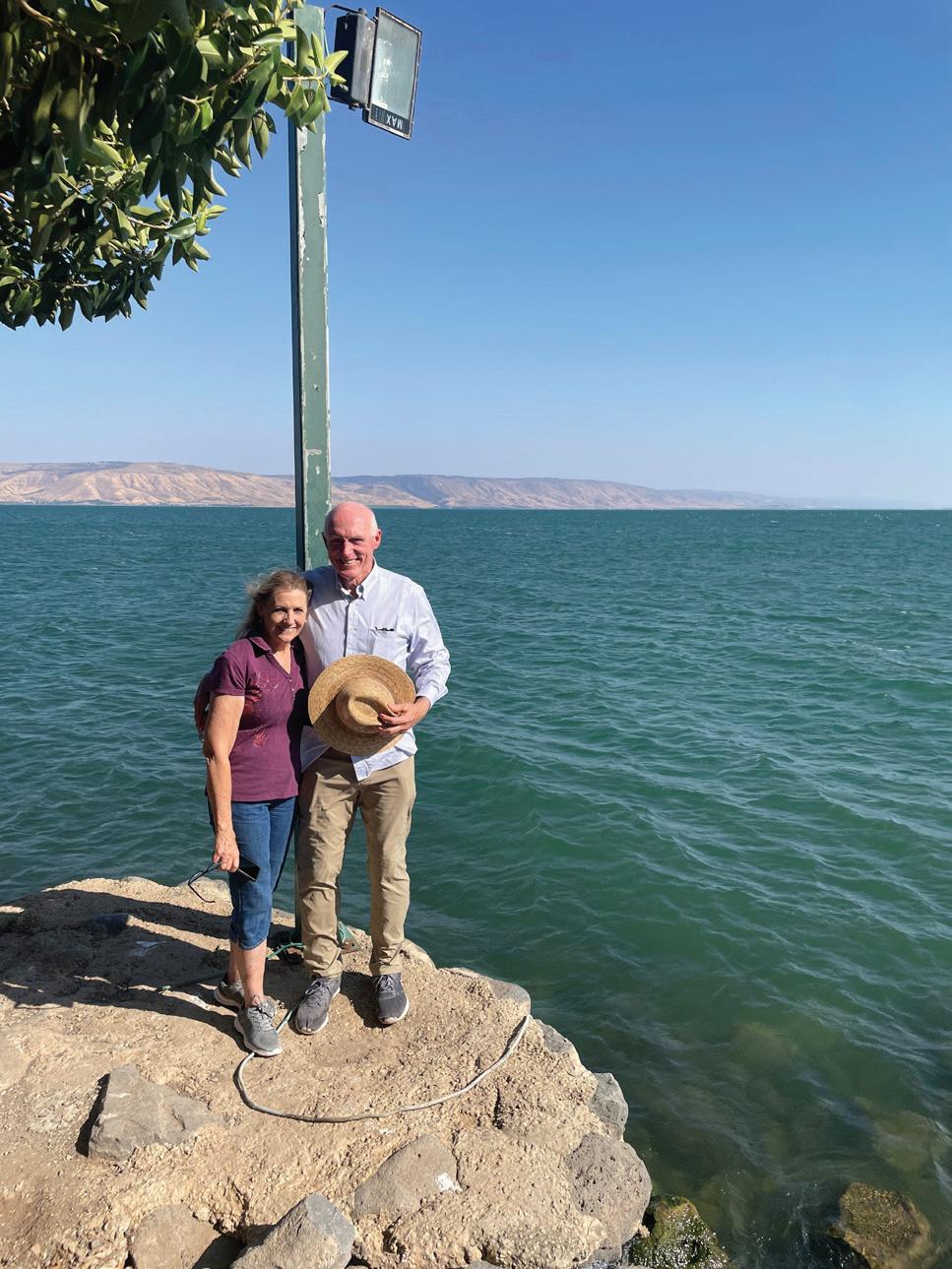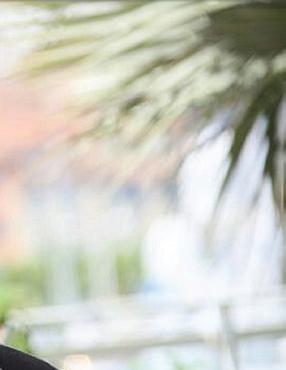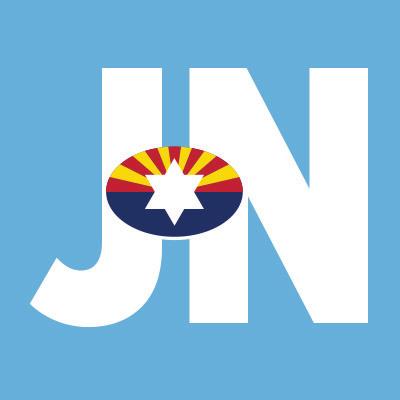
10 minute read
Water crisis draws Arizona’s house speaker to Israel

SHANNON LEVITT | STAFF WRITER
Advertisement


Arizona is facing a water crisis. The Colorado River, which Arizona and other Western states depend on for water, is at record low levels — so low that cuts have been implemented already, and steeper cuts are on the way, especially for the state’s farmers.
With an acknowledged sense of urgency, Arizona House Speaker Rusty Bowers recently visited Israel to meet with leaders of water technology companies and legislative bodies in a bid to discover some of the desert nation’s secrets for dealing with a lack of water.
“We were there to learn,” Bowers told Jewish News. “There are educated and tested people in Israel on this issue.”
In fact, he met with so many people in a variety of places, he said it felt like “a forced march” at times, but the rigorous schedule paid off in the enormous amount of information he received.


The main topics of discussion were desalination and its transportation issues, uses of newer technologies for determining water efficiency and its transport and regulation, especially in cities — “block to block, house to house,” he said.
For things like desalination to pan out, however, time and a whole lot of money are needed. Whether there is the stomach for the sacrifices, he said, “is the $3 billion question because that’s just a low ball of what we’re looking at for desal.”
One pointed conversation with the head of Mekorot, Israel’s national water company, stood out. Bowers said it was sobering because it emphasized that any water Arizona gets through desalination or other sources needs to be in a system that has supportable pressure gradients and does not leak. Arizona’s system is not where it should be.
“We need to get our order right in how we go about this,” Bowers said. “Phoenix, for example, generally has an old system. There’s no reason to put very expensive water into a leaky system.”
Bowers’ trip took place Aug. 5-12, at the suggestion of Gov. Doug Ducey, who went himself a few months ago to tour a desalination plant.
“The governor considers Israel the world leader in how to manage this precious resource and looks to it as a model,” said C.J. Karamargin, Ducey’s director of communications. “It was important for all people who are concerned, and in a position to do something about it, to see what Israel is doing.”
Sharon Megdal, the director of the University of Arizona Water Resources Research Center, has also spent a lot of time researching Israel’s water use and connecting people dealing with water shortfalls who she hopes can learn from the country’s experiences.
“They’ve been leaders in showing different ways to utilize, conserve, stretch and manufacture water supplies through desalination,” she said. Those dealing with similar water issues will have to find what’s relevant to their situations and ways to modify their approach.
For example, Arizona’s leaders will have to decide on the type of desalination and spend time doing research and planning. Arizona would face hurdles in both seawater desalination — no ocean bordering the state — and/or brackish water, highly salinated groundwater, desalination and where to put the wastewater in terms of energy costs and carbon footprint, she said. Both leave enormous amounts of salty water that cannot be placed just anywhere.
Bowers was most hopeful about Israel’s broad use of reclaimed water and brackish water and suspects that Arizona could learn to use its own brackish water, which his office defined as a mix of fresh and salty water, originating from seawater, in underground aquifers.
In the Arava region, he and his wife tasted all kinds of vegetables grown with brackish water. “My wife and I are hooked on Israeli tomatoes,” he said.
“We have brackish water and maybe they would cough up some of their ideas for our local agriculture folks to try out.”
In the face of a crisis people might want to rush to an answer, Megdal said, but it’s important that those in charge spend time studying the options.
“These are big problems and there isn’t a single solution,” she said.
Bowers was impressed with Israelis’ focus on and respect for water, which is an ethic he wants Arizonans to feel. Ultimately, the people who have to pay the cost of their water won’t waste it, he said.
In terms of the equity in who shoulders those costs, Bowers said: “To make the system accessible — the cost has to be what the water is and what its costs are.”
Megdal said this was an area of significant difference between Israel, where water is centrally controlled by the government and costs are equal no matter where one lives, and a state like Arizona, which is decentralized. But she’s optimistic that the recently established Arizona Water Authority is a step in the right direction.
Bowers pointed out changes people can make now, like converting lawns from grass and moving away from swimming pools. He also applauded the water authority’s funding that will allow the state to accomplish some of this on a broad scale to help cities make costly changes.
He takes his advice to heart for himself and his neighbors, too.
On his property of 42 years in Usery Pass, northeast of Mesa, “I have foregone my lawn, and we emptied my lily pond last year,” he said. “But I have a neighbor who has two lakes and I’m thinking, ‘OK, sometime we’re going to have to address that.’”
He said that Arizona and the other lower basin states have been planning for a water shortage by buying and holding water in storage for decades. Those supplies are needed now in the short term.
“We in Arizona have been doing as good or better than any other state in our water preparations,” Bowers said. “But we did not think this last push was going to come so quickly. We only have a few years now, unless nature decides to favor us differently, to get this right.”
Everybody from developers to everyday citizens expect there to be water when they turn on the tap, and “we don’t want to get to a place where that doesn’t happen,” he said.
The stress of dealing with this crisis has transformed him, he admitted. The balding Bowers quipped that until recently, he had hair as thick as the jovial painter Bob Ross. “That’s what worrying about water does to you,” he laughed.
And even though he doesn’t believe anyone can predict what will happen with climate change or that the drought will last forever, he said, “for now, this is our reality and we have to face it straight up.”
The Israelis he met, a number of whom live in inhospitable places and are hyper aware of how critical water is to their success, inspired him. He hopes to bring back some of the pioneering spirit he witnessed.
Bowers has 20 grandchildren, and he said it was important to leave them a good name and part of that legacy is the way he deals with assignments like this.
Bowers will leave the legislature at the end of this year’s term.
“However legacy plays in this, I want my part in it to be that I did the best I could and that I would in some way be watching out for them and all of their age group and our future as a state — and water is critical to all of it.” JN
2022 Phoenix Jewish News Print Dates
January 7
January 21
February 4
February 18
March 4
March 18
March 25
April 1
April 8
May 6
May 20
June 10
July 8
July 29
August 5
August 19*
September 9
September 16
September 23
October 7
October 14**
October 21
October 28
November 4
November 18
December 2
December 16
*Best of Magazine **Annual Directory
WWW.JEWISHAZ.COM
| advertising@jewishaz.com subscriptions@jewishaz.com | www.jewishaz.com
PUBLISHER Jewish Community Foundation of Greater Phoenix

GENERAL MANAGER Rich Solomon | 602.639.5861 rsolomon@jewishaz.com
MANAGING EDITOR Mala Blomquist | 602.639.5855 mblomquist@jewishaz.com
STAFF WRITER
Shannon Levitt | 602.639.5854 slevitt@jewishaz.com
ADVERTISING SALES CONSULTANT
Jodi Lipson | 602.639.5866 jlipson@jewishaz.com
SUBSCRIPTIONS 602.870.9470 x 1 subscriptions@jewishaz.com
GRAPHIC DESIGNER
Jay Sevidal | 410.902.2313 ads_phoenixjn@midatlanticmedia.com
Roberts, Publisher | 2013-2016 Florence Newmark Eckstein, Publisher | 1981-2013 Cecil Newmark, Publisher | 1961-1981
Newmark, Editor | 1961-1981 M.B. Goldman, Jr., Founder | 1948-1961
PROUD MEMBER OF
Headlines
HIGH HOLIDAY SERMONS
CONTINUED FROM PAGE 1 thinking. While some rabbis are just putting the finishing touches on their sermons, some procrastinators might be starting to sweat a little. For example, Scottsdale’s Congregation Or Tzion’s Rabbi Andy Green puts himself in the latter camp.

“I’m a notorious procrastinator,” he told Jewish News. “What I have to say and how I end up saying it won’t be finalized until closer to the big day, but it will be ready the morning I deliver it.”
He already knows some of the things he will be talking about: how the Jewish community has responded to the challenges of COVID-19 and how “social division has fragmented our communities in a way that didn’t exist before.”
In Paradise Valley, Temple Solel Associate Rabbi Debbie Stiel also plans to discuss “toxic polarization.” Though it’s “a very tough issue,” she said, “it is an important topic to face so that we keep connections with others, even if we disagree with them. We need to continue to see the holy in others despite our differences.”
Green, Stiel and other local rabbis intend to use the time and space they’re given each year during this period to provide thoughtful analysis of many complex ideas. They want their congregants to take this time to listen and reflect on their messages. While so much of everyday life seems to consist of simple and short bursts of ideas and thoughts, many programmed by social media algorithms, rabbis use these sermons to slow things down, think about timely topics and encourage others to do the same.
For example, after two years of mostly online High Holiday services, many of Greater Phoenix’s rabbis will be emphasizing the importance of community to their large and primarily in-person congregations.
Chabad Jewish Center of Mesa Rabbi Laibel Blotner said this is the perfect year to talk about community. He pointed out it is the hakhel year, a time when Jews have historically gathered following the shmita, or sabbatical year. He sees the timing as opportune.
“The fact that the first year in three years that Jewish people have an opportunity, uninhibited for the most part, to come together and be in our synagogues is also a year associated with gathering, is divine providence,” he said.
“God has given us this year that we can come to the synagogues and feel, for the most part, safe, and we should try to make sure that this is the largest Rosh Hashanah and the largest Yom Kippur.”
Temple Chai Associate Rabbi Bonnie Koppell in Phoenix will also be emphasizing the importance of community, especially the synagogue. She plans to talk about the present by invoking the past, that of her childhood Jewish community in Brooklyn.

“As we walked to one of the two local shuls on the High Holidays, it was a joy to see the streets fill with more and more people and to sense the deep connection that we all felt to each other,” she described in one sermon.
With so many members coming to Temple Chai in person after two years of live streaming, Koppell will tell her congregants: “We, all of us here together, are the creators and sustainers of this fragile and precious community.”
Rabbi Alicia Magal, spiritual leader of the Jewish Community of Sedona and the Verde Valley, is developing her sermon with the idea of “waking up.” She, too, will talk about new ways of creating community in, what hopefully, will soon be a post-COVID world.
“We’ve been in a kind of sleep over the past two years and are just now slowly awakening,” she plans to tell her congregation. While “we aren’t out of the woods yet,” she will encourage people not to remain “spiritually asleep to new possibilities.”
It is time to wake up to “new ways of interacting and showing up in our family, our community and the wider world,” which includes our responsibilities as citizens of a world that is imperiled on many levels, with “the poor, refugees, the war-wounded, the choking environment and the melting icebergs.”
Cave Creek’s Congregation Kehillah Rabbi Bonnie Sharfman will talk about how all of these same problems and responsibilities can “leave many of us feeling overwhelmed,” which sometimes leads to paralysis.
“There is so much for us to do to heal the injustice and pain in the world and also to heal the earth. Small things, in the communal aggregate, do move us forward. Kindness, compassion, commitment, teshuvah, as always, are sorely needed.”
Temple Solel Rabbi John Linder said, “At a time of great despair, Jews must do what we’ve always done — lean into hope.” The hope that he will speak about will be focused on “our temple’s youth and families, our country’s democracy and our obligation to be agents of change.”
Temple Kol Ami Rabbi Jeremy Schneider in Scottsdale will be discussing mental health and the toll two-and-a-half years of a pandemic and its pursuant isolation have taken on his congregation. While “we did a pretty good job of checking in on others, have we checked in with ourselves? What steps are we taking to address anxiety and depression?”
He will tell his audience how important it is “that in our annual gathering to make ‘atonement,’ we also make sure we are ‘at-one-ment’ with our mental health and ourselves.”
Chabad of the East Valley Rabbi Mendy Deitsch plans to address “the multidimensional human being and its inner strength to deal with today’s world issues.”
Temple Beth Shalom of the West Valley Rabbi Dana Evan Kaplan will talk about spiritual renewal and how to achieve it through prayer and positive psychology, which studies the traits that help people thrive. “It is based on the belief that people want to lead meaningful and fulfilling lives, to cultivate what is best within themselves, and to enhance their experiences of love, work and play,” he explained.
Temple B’rith Shalom Rabbi Susan Schanerman in Prescott will be celebrating her first High Holidays with her new congregation. She looks forward to meeting “the entire congregation” and plans to focus “on personal themes of selfforgiveness, crafting the self and coming home to Judaism.”
In Chandler, NefeshSoul Congregation Cantor Roger Eisenberg, who will be writing and delivering his first ever High Holiday sermon, will focus on the concept of gratitude.
“Even in times of grief, we can be grateful for the compassion of those who comfort us. Even in times of fear, pachad, we can find hope in yirah, in the humility of awe,” he will tell his congregants.
Rabbi Stephen Einstein, who will be leading services for Congregation Beth HaMidbar in Yuma for his eighth year, will talk about change and remembrance.
The above is only a small sampling of what will be discussed in synagogues across the city. Much of it is serious fare, but on the lighter side, Einstein also will talk about Yom Kippur’s 100-plus rules for practicing business. JN
There are many rabbis and temples in Greater Phoenix, more than we had room to include. Please visit digital.jewishaz.com/issues/CommunityDirectory-2022/index.html for a comprehesive guide to all of our local spiritual resources.











